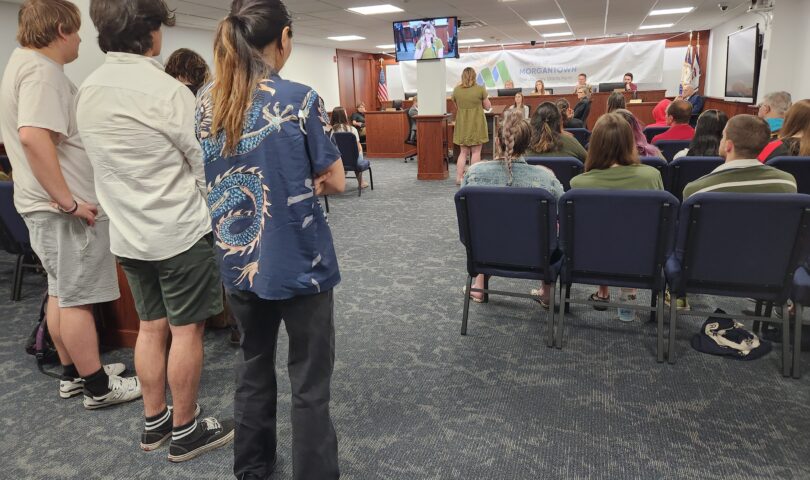MORGANTOWN — Wearing stickers with slogans like “Housing Not Handcuffs,” “No Housing No Peace” and “Poverty Is Not Criminal,” an overflow crowd showed up at Tuesday’s Morgantown City Council meeting intent on making the issues facing the city’s unhoused population council’s top priority.
And for a second consecutive meeting, well over a dozen speakers stood to address the issue — many offering suggestions, as members of council requested during the April 2 meeting.
These suggestions ranged from ensuring there are accessible restrooms available in and around downtown; to city-funded lockers/storage options; to the creation of a housing department within the city; to organizing a regional affordable housing fund — to name just a few.
Lindsey Jacobs said she believes the urgency many in the community feel about homelessness isn’t being matched by the city.
“The message I’m receiving from you is you that you don’t own the problem because you think it’s unfair that you have to deal with it in the first place,” Jacobs said. “No one twisted your arm to be elected officials in Morgantown. So, we’re demanding action. No more excuses.”
Lesley Nash said the “housing first” approach is the only approach proven to be successful.
“It is not a problem of individuals responsibility. It is not a problem of substance use disorder or mental illness or disability. It is a community problem where you lack sufficient housing for the number of people who need a place to live,” Nash said. “It also considers that housing is a right to which every person is entitled and focuses on meeting people where they are.”
While discussions about the number of unhoused individuals living in and around the city are not new, they’ve certainly picked up in tone in recent weeks following the announcement that the 28-bed Bartlett Housing Solutions triage shelter in Hazel’s House of Hope — the area’s largest and most established shelter — is currently slated to close no later than June 30.
While efforts to keep the facility open are underway, it’s still unknown publicly whether that will happen.
A number of Tuesday’s speakers utilize the shelter and asked the city to intervene.
Others reiterated the belief that the city should allow a managed camp or at least stop removing encampments given the lack of options for those without shelter.
Councilors Danielle Trumble and Brian Butcher both said they’ve had recent discussions with representatives in Wheeling.
That city’s council adopted a law outlawing encampments and then responded to backlash by moving a managed camp onto city property.
“We have been in touch about how that has gone in their community because it has had to move a time or two as they have run into different issues,” Trumble said. “I would like to try to avoid that in our community if we can; so, trying to figure out what they’re doing right and what they’re doing wrong and how to best optimize something like that if that is the future that our community is going to take, or even temporarily take.”
A reoccurring talking point from members of council is that the city can’t and shouldn’t take the issue on alone. It needs the help of the county and the surrounding municipalities.
“There’s no one magic cure. There is a community that will come together and deal with these problems. If we do that cooperatively, there are things we can do to lessen the circumstance, perhaps,” Councilor Bill Kawecki said.




